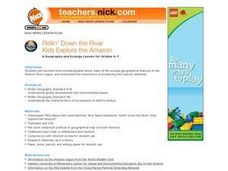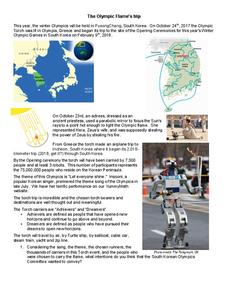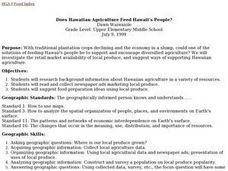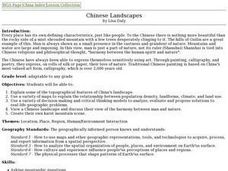Curated OER
Shopping for Souvenirs In the Middle East
Students participate in a role play in which they are shopping for souvenirs in the Middle East. Using maps, they locate the Middle East and identify each country within the region. They create a key map for the types of souvenirs that...
Curated OER
Cultural Mapping
Students are introduced to the cultural diversity in Australia. Using new vocabulary, they define multiculturalism and explore their own cultural backgrounds. In groups, they complete a series of worksheets to develop a better sense of...
Curated OER
Structures on a Light Station
Students identify structures needed for a lighthouse station. Groups of students create structures at a lighthouse station with their bodies. Pairs of students create structures found at the Fenwick Island Lighthouse Station circa 1861.
Curated OER
Fields of Candy Bars
Students research and write about the origins of the ingredients in candy bars. They taste them and describe what they are tasting. They use descriptive words to write a paragraph describing the candy bar. They research ingredients in...
Curated OER
A Geography and Ecology Lesson for Grades 4-7
Young scholars explore many of the unusual geographical features of the Amazon River region, and explain the importance of preserving the tropical rainforest.
BBC
EU, UN, and Commonwealth
Find out how international government organizations work to face global issues. Learners examine if major organizations like the EU, UN, and Commonwealth are effective at tackling big issues like animal protection. They think about...
Curated OER
Geo-Magazine
Divide your geography class into groups and have each research an assigned region. The result of this project is a regional magazine that addresses the five themes of geography. Many valuable resource links are embedded into the...
Echoes & Reflections
Perpetrators, Collaborators, and Bystanders
After the Holocaust, the world grappled with how to bring justice to the Nazis. But what to do with the thousands—if not millions—who allowed it to happen? Young historians consider the issues of guilt, collaboration, and responsibility...
Curated OER
Following the Great Wall of China
Students investigate the building of the Great Wall of China during the Ming Dynasty and utilize the story of the wall to examine some of the history of China.
Curated OER
Forecasting the Path of Mudflows
Students watch a demonstration to introduce them to the consistency of mudflows and how they move. In groups, they compare and contrast volcanic avalanches and mudflows. They create their own model of a volcano, simulate how it erupts...
Yummy Math
The Olympic Flame's Trip
Just in time for the start of the Winter 2018 Olympics, you can track the Olympic torch relay through the Republic of Korea. But there must be some math involved, right? Give learners a learning exercise that prompts them to calculate...
iCivics
Drafting Board: Military Intervention
Should countries use their militaries to stop humanitarian crises in other countries? Learners make claims, organize their reasoning, and provide evidence for their arguments with this rich resource.
iCivics
Drafting Board: Electoral College
Should the president of the United States be voted by the Electoral College or the popular vote? Your young historians will consider the pros and cons of the Electoral College, and make an argument using reasons and evidence...
Curated OER
In My Other Life
Students explore various cultural identities. They conduct Internet research, develop a questionnaire that profiles information from their selected culture, and write a letter to a pen pal in the U.S. explaining what life in their...
Curated OER
The History of Paper Money
Pupils research the history of paper money using the Internet in order to answer questions and create their own bills.
Curated OER
Does Hawaiian Agriculture Feed Hawaii's People?
Students research background information about Hawaiian agriculture in a variety of resources, then read and collect newspaper ads marketing local produce. They suggest food preparation ideas using local produce.
Curated OER
Why Kosovo? Why Now?
Students explain the establishment of the modern state of Yugoslavia and the breakup of the country. They examine the human characteristics of the region - ethnic groups, languages, and religions.
Curated OER
What's Integrity?
Young scholars read a letter by Steve Williams to determine why self-discipline and integrity are important attributes for peace corps volunteers. They apply these concepts to their own lives.
Curated OER
European Union Governance
Become familiar with the structure and functions of the European Union. As they conduct internet research, young historians use an attached worksheet to categorize the five main institutions of the EU. A flowchart worksheet also gives...
Curated OER
How Mountains Shape Climate
Students use raw data to make a climatograph; they explain the process of orographic precipitation and the concept of a rain shadow.
Curated OER
Chinese Landscapes
Students explain some of the topographical features of China's landscape. They view a Chinese landscape and discuss their view of the harmony between man and nature, then create their own karst mountain scene.
Curated OER
Changing Borders
Middle schoolers explain that the boundaries between countries are not permanent, then analyze current events and stories as examples of cooperation and conflict. They describe a place using physical and human characteristics.
Curated OER
Tissue Paper Geography
Young scholars explore geographic features of the desert and apply their understanding of the topography of the desert by creating a tissue paper painting.
Curated OER
Treaty of Versailles
Students describe the purposes of the Treaty of Versailles. In groups, they analyze the causes and effects of the treaty and discuss why the Americans were so against it. They note ideas for and against its ratification and they make...























